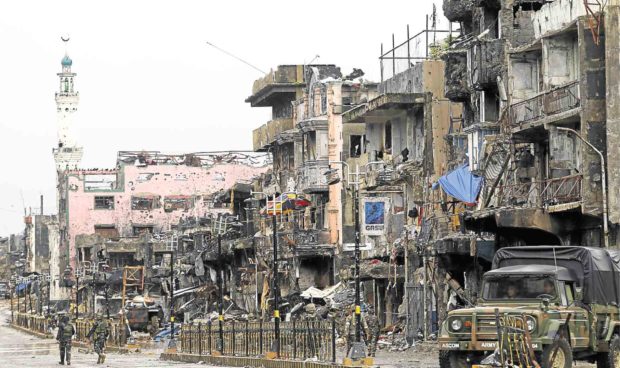Search for bombs delays Marawi rehab

This area in Barangay Lilod Madaya in Marawi City remains off-limits to civilians. —DIVINA SUSON
MARAWI CITY — Government troops continue to find unexploded bombs in areas that had become battlefields during the war on terror here, delaying the start of rehabilitation efforts, according to a high-ranking military official.
Col. Romeo Brawner, deputy chief of Joint Task Force Ranao, which supervises security operations in the city, told Inquirer while soldiers had not encountered any more Islamic State (IS) followers in the city, they continued to find unexploded ordnance and improvised explosive devices (IEDs) planted by fleeing terrorists.
Some of the unexploded ordnance were artillery heads fired by either the military or the IS-affiliated Maute and Abu Sayyaf Group. They also included bombs dropped by military planes that did not explode.
Slow task
The IEDs were planted by Maute and Abu Sayyaf gunmen to deter the advance of government soldiers, but were left unexploded when the terrorists fled.
Article continues after this advertisementSince President Duterte declared the city liberated from terror in October, Brawner said soldiers had already recovered and safely disposed of at least 560 unexploded bombs and IEDs.
Article continues after this advertisementHe said as of Friday, the Joint Task Force Ranao had finished clearing only three of nine sectors of the battle area. The task force had divided the main battle zone into nine sectors to make the work of clearing these more efficient.
At least 35 percent of the main battle area had been cleared, but more unexploded bombs were believed to be in at least three sectors that were the sites of the fiercest clashes between government soldiers and terrorists in the city, according to Brawner.
Nine sectors
These areas, he said, were the last strongholds of terrorists and were adjacent to the lake.
Clearing operations by military and police bomb disposal teams are ongoing in a sector composed of the villages of Kapantaran and Wawalayan Marinaut, Brawner added.
Clearing operations were not moving as fast as authorities wanted it to because some of the unexploded bombs were buried deep in the ground and “difficult to excavate”. Some bombs were buried 10 meters deep, he said.
No civilians
The military expects clearing operations to be finished by April. Brawner said by that time, the Task Force Bangon Marawi could start rebuilding efforts.
Until the main battle zone, composed of at least 24 villages, had been cleared, it would remain off limits to civilians, including government officials, Brawner said. —Divina Suson